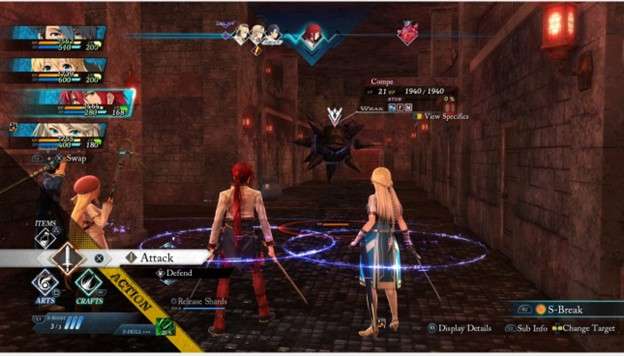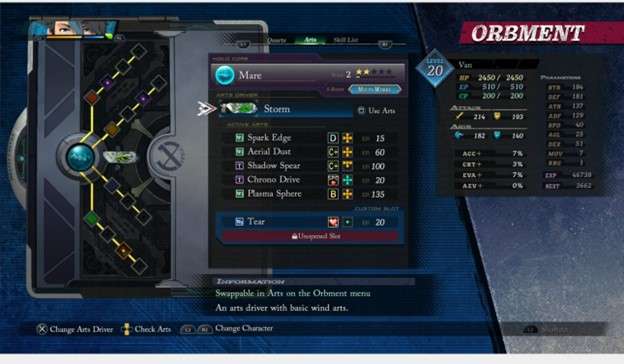The Legend of Heroes: Trails through Daybreak marks a grand introduction for newcomers and a thrilling continuation for veterans of the series. As a handheld gaming console reviewer, diving into this title has been nothing short of captivating. This game exemplifies what handheld RPGs can offer, seamlessly blending traditional elements with modern innovations to deliver an engaging experience.

The Legend of Heroes: Trails through Daybreak First Impressions and Storyline:
Embarking on The Legend of Heroes: Trails through Daybreak as my first foray into the series, I found myself immediately drawn into the intricate narrative. The game thrusts players into the shoes of Van Arkride, a detective with a penchant for taking on jobs that teeter on the edge of legality. Van’s journey begins with a seemingly simple task: recovering a stolen antique watch. This mission sets the stage for an elaborate mystery that unfolds across the modern-day Republic of Calvard.
The game excels in creating a living, breathing city where every corner holds potential clues and every character interaction adds depth to the storyline. Players must explore various districts, engage with the local populace, and piece together the mystery through dialogue and investigation. The sense of immersion is heightened by the meticulous attention to detail in the world-building, making each exploration feel rewarding.
Gameplay and Combat:
A standout feature of Trails through Daybreak is its innovative combat system, which offers a dual-mode approach to battles. The game retains its traditional turn-based combat for boss encounters, ensuring that strategy enthusiasts can still indulge in methodical planning. However, regular encounters now unfold through an action-based Field Battle system. This dynamic shift allows players to engage enemies in real-time, executing three-hit combos and dodging attacks with precision.

Field Battles introduce a strategic layer where players can stun enemies with real-time attacks before transitioning seamlessly into turn-based mode. This hybrid system enhances the gameplay experience, blending the best of both worlds. Building up a meter through successive strikes to unleash powerful special attacks adds an element of excitement and risk, as being knocked down during this phase gives enemies the upper hand in the ensuing turn-based combat.
Player Agency and Alignment System:
Trails through Daybreak empowers players with significant agency through its alignment system, a feature that profoundly impacts the narrative and gameplay. As players navigate the main story and side quests, their choices influence Van’s values for Law, Gray, and Chaos. These values, in turn, affect character interactions and the storyline’s progression.
For instance, a side quest involving a bicycle thief offers players a moral dilemma: turn the thief over to the police or allow him to work off his debt to the victim. Such decisions add layers of complexity to the gameplay, encouraging players to consider the consequences of their actions. This system enhances replayability and personalizes each player’s journey, making their experience unique.
Enhanced Systems and Mechanics:
Trails through Daybreak brings several revamped systems to the table, further enriching the gameplay experience. The cooking system, for instance, has been overhauled to provide more consistent rewards. Players can now earn Gourmet Points by having their party members eat, which contribute to ranking up and unlocking bonuses such as increased defense. This mechanic encourages players to explore various locations to discover unique foods, preventing unnecessary stockpiling and adding another layer of strategic planning.

The game’s quest structure remains familiar to series veterans, with Van receiving additional optional requests alongside main and side quests. Connect Events make a return, allowing Van to bond with party members. These interactions delve into the characters’ backstories and personalities while providing stat boosts. However, players will need to choose carefully, as it’s impossible to experience all options in a single playthrough.
Visuals and Presentation:
The transition to a new engine in Trails Through Daybreak is a visual treat, showcasing enhanced lighting, reflections, and textures. While the shadows may not be as pronounced as in some contemporary titles, the overall graphical upgrade is appreciable. The game maintains its signature aesthetic, ensuring that long-time fans feel at home while enjoying the visual enhancements.
The user interface (UI) has also received a facelift, with the combat screen now packing a wealth of information. This compact design is generally well-executed, though there are valid concerns about readability on smaller screens. Nonetheless, the UI enhancements contribute to a more polished and modern presentation.
Conclusion:
The Legend of Heroes: Trails through Daybreak represents a significant leap forward for the series, blending traditional elements with innovative mechanics to create a compelling and immersive experience. For newcomers, it offers a welcoming entry point with a rich narrative and accessible gameplay. For veterans, it introduces fresh elements and exciting changes that breathe new life into the series.
Having experienced the demo, I can confidently say that I am now a fan of The Legend of Heroes series. The demo’s captivating story, innovative combat, and enhanced systems have left me eagerly anticipating the full release. **Trails through Daybreak** is poised to be a standout title in the handheld RPG genre, promising countless hours of engaging and rewarding gameplay.
For more information, visit the official website.
Related: Reviews by Korin Feyh
I've been hooked on gaming since my 1st console an Atari in 1977. Since then. I have owned or played every console I can get my hands on, I'm just a little bit addicted!






More Stories
Nintendo Download Update (Feb. 19, 2026)
Available Today, Xenoblade Chronicles X: Definitive Edition – Nintendo Switch 2 Edition Features Enhanced Visuals
MENACE Review for Steam Early Access